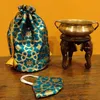[Startup Bharat] This Jaipur-based sustainable fashion brand aims to revive traditional embroideries
Jaipur-based The Loom Art works with weaver clusters across India to create apparel that showcases traditional craft forms such as Kantha, Sujini, and Arashi Shibori. The slow fashion startup is readying to launch a jewellery line and open its first store this year.
The world may be on a faster track than ever before but more and more people are now opting for slow fashion.
Keen to propagate slow fashion, which involves local artisans and eco-friendly materials to preserve crafts and the environment to provide value to consumers and producers, Aarushi Kilawat in 2017 founded The Loom Art.
This Jaipur-based startup creates clothes that are “at the intersection of art, handloom, and sustainability” and aims to revive old and dying craft techniques, and make clothes that last a lifetime.
“I wanted to create something that could be passed on from one generation to another. I have always been driven towards handlooms. To me, handloom means a piece of khadi or silk, or any material that is woven with love. These are materials that have traversed a whole journey,” Aarushi says.
The Loom Art was born with the idea of creating a platform for artisans, to help sustain livelihoods of talented individuals, and make sustainability a way of life.
“The art in The Loom Art stands for the core hand embroideries that we do. We mainly work with Kantha and Sujini, because my idea of design is that it's a mode of communication where you can narrate stories… these crafts have stories attached to them,” Aarushi says.

Kantha is a centuries-old traditional embroidery form that has evolved from the thrift of rural women in Bengal while the art of Sujini comes from Bihar and can be traced to soft, embroidered quilts made for newborns in the 18th century.
Getting started
Aarushi grew up in the small town of Beawar in Rajasthan, mesmerised by different art forms and fashion. While still quite young, she visited Ahmedabad and was awestruck by the colourful clothes worn by students she saw when passing by the National Institute of Design (NID) and National Institute of Fashion Technology (NIFT) campuses.
“I was very young when I knew that I wanted to do something in design. The people in my town laughed it off as it was all very alien, but my father was very supportive,” she recalls.
Aarushi graduated from Pearl Academy, finishing a bachelor’s degree in fashion design. She went to Nottingham University for six months on an exchange programme to study print design and fashion styling, and started her design journey with products themed “design for a cause”.
Alongside, she served on the Board of Directors for Naya Savera, a non-government and not-for-profit charitable organisation. While working for a school for the visually impaired in Jaipur, she also created a braille product book they could use to shop.
After a few years doing styling jobs in Mumbai, Aarushi landed a job with a renowned Indian fashion designer. However, she did not take up the job because she did not feel “connected to the fashion they created” and moved back to Jaipur.
“I did not know that I wanted to be an entrepreneur. My father celebrates a lot of different lines of businesses that he built from the ground up. I believe the zeal to become an entrepreneur came from him,” she says.
Aarushi started the company by taking a loan of Rs 25 lakh from the Bank of Baroda under a scheme for female entrepreneurs. She began with a team of four people including a tailor, an embroiderer, and a master.
She took another loan of Rs 25 lakh in 2020 to scale the company. Other than that, the company functions on its own money cycle.
Of art and artisans
The Loom Art produces apparel from different types of silks, jamdanis, khadis, and bandhej, all based on Aarushi’s designs.
The startup works with over 20 clusters of craftsmen based in different parts of the country to weave these fabrics. Each cluster has approximately eight weavers.
“Since I have a fashion background, I have friends who work in textiles. I reached out to my sources, and found vendors. For instance, a vendor in Kolkata took me to a village called Murshidabad, which is where I chanced upon a small cluster that makes jamdanis and khadis,” she says.
Clusters in Benaras weave the silks and chanderis, those in Bengal develop the khadis and jamdanis, and weavers in Kutch supply mulberry silk and matka silk.

A team of 20-23 in-house craftsmen use Kantha and Sujini as narrative crafts to create works of art on these fabrics.
“If we come up with a new technique, I send my master craftsman to that particular city and ask him to learn it. He will stay there for about 10 days and return to teach other embroiderers in his team. This helps us control the quality of the embroidery,” Aarushi says.
Since the last two seasons, the slow fashion brand has also incorporated Arashi Shibori as one of the core elements of its designs. The Japanese tie-dye art involves wrapping the fabric on a diagonal around a pole and scrunching to create patterned and pleated fabrics. Only up to two metres of fabric can be dyed using this technique, ensuring slow and sustainable fashion.
The market and outlook
According to a report by Research and Market, the global market for sustainable fashion stood at $5.4 billion in 2021 and is expected to grow at a CAGR of 9 percent to $8.3 million by 2025. The growing awareness of the adverse effects of the textile industry on the environment is encouraging customers to opt for ethical fashion materials.
Sustainability will offer fashion’s biggest opportunities for growth, a report by McKinsey said.
Since handlooms came back in vogue, many designers have found this space to be full of opportunities and built their brands around the same. Some of these brands based in India are Core, Echo Studio, APZ, Urth Label, The Third Floor Clothing, Buna, Bennch, Tahweave, Iyla, and others.
The Loom Art sells throughout the world, via an omnichannel model. The brand sells to retailers on both Sale or Return (SOR) and wholesale basis. In India, it is available in brick-and-mortar stores of high-end multi-brand, multi-designer stores such as Pernia’s Pop-up Shop and Ogaan.
The startup’s offerings are also available online via its website and on fashion marketplaces like Aza Fashions, Pernia’s Pop-up Shop, Ogaan, Tata Cliq, Nykaa, and others. The company also does pop-ups.
The Loom Art collections are available through Ounass in the UAE, Omi Na-Na in the UK, Rue Saint Paul and The Klazet in the US, and Ammarah Collective in Canada.

The brand was able to break even in 2020, three years after it was launched. The company makes sales between Rs 10- 12 lakh a month, which increases if the company does any events or pop-ups.
Aarushi has plans to expand by launching a jewellery line made from brass and silver with 22-karat gold plating in the first week of March. The brand is also collaborating with another label to launch a line of perfumes and body mists by mid-2022.
“Our first flagship store will also go live in June 2022 in Hyderabad because it’s the city that provides us with most customer traffic in India,” Aarushi says.
Edited by Teja Lele


![[Startup Bharat] This Jaipur-based sustainable fashion brand aims to revive traditional embroideries](https://images.yourstory.com/cs/2/4d03ae105be411ebb93d1523d01d233d/ImageBranding-Amisha15-1645095185055.png?mode=crop&crop=faces&ar=2%3A1&format=auto&w=1920&q=75)







